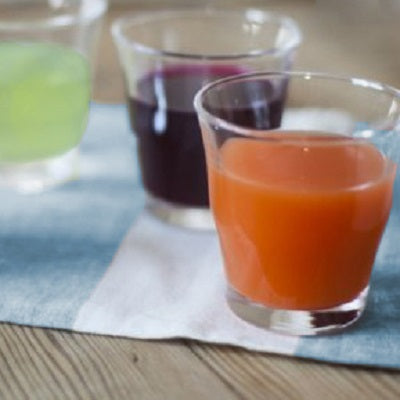
This is part 2 of the fermented fruit / vegetable juices. Last time we looked at which fruit juices worked best with water kefir. This time we are looking at vegetable (mostly) juices fermented by water kefir.
Vegetable juices are typically not as sweet or as tasty as fruit juices, but they have their own host of health benefits. Combine that with the power of water kefir fermentation and those vitamins and benefits can become even more readily accessible.
Compared to fruit juice ferments, vegetable ferments tend to have greater microbial activity (more probiotics), more acids and less alcohol (likely due to the less sugar).
How to do a water kefir 2nd ferment with vegetable juices
Steps
- Do the usual 1st ferment with water kefir grains and a sugar mixture.
- Strain water kefir grains from the finished kefir.
- Pour finished kefir into glass container with a lid. Swing top bottles work great for this as it will help build the carbonation.
- Pour 1/4 to 1/2 cup per quart of vegetable juice of choice (raw is recommended) into the bottle with the kefir. If you are using a 16 oz swing top bottle, use 1/8th to 1/4 cup of juice.
- Close lid and let it set for 12 to 48 hours at room temperature. An alternative is let is sit in the fridge for 3-4 days. Be careful of too much carbonation as it can break the bottle! Burp the lid or jar every so often if you feel you need to.
- Drink fresh or chill in the fridge before consuming. Enjoy :)
A detailed study on water kefir 2nd ferments with vegetable juices
Another fascinating study recently came out testing 6 different vegetable juices fermented with water kefir during a 2nd ferment.
They tested all sorts of different things like the alcohol level, carbonation, antioxidant ability, acidity and they even used a panel of people to judge the final taste of the water kefir vegetable juice.
They tested carrot, fennel, muskmelon, onion, strawberry and tomato juice.
Oddly enough they included strawberry and tomato as vegetables even though its a scientific study.
Probiotic Count
One of the biggest advantages of fermenting with vegetable juices is the amount of probiotics. Fermented vegetable juices create plenty of good microorganisms. Muskmelon had the highest probiotic count. Strawberry had the lowest. Carrot, fennel, onion, tomato were in the middle.
With the fruit juices, prickly pear had the highest amount of bacteria and yeast, but compared to the vegetable juices, it would rank somewhere in the middle.
Alcohol
For many people the biggest benefit for vegetable fermenting with water kefir is the lower alcohol level. If you prefer higher alcohol, then fruit juice is a better option. Carrot, muskmelon and strawberry juice had the higher alcohol levels (between 2 to 3%). Fennel had .63% and onion juice barely registered at .09% alcohol. So if you are trying to get drunk, fermented onion juice is NOT a good idea.
Compared the fruit juices, 3 of the fruit juices (grape, pomegranate and quince) had alcohol levels over 4%. Carrot juice was the only one that had barely 3%.
Antioxidants
Antioxidants protect against aging and all sorts of diseases, so its always important to incorporate antioxidants into the diet whenever possible.
Out of the 6 juices that were fermented with water kefir - onion, strawberry and tomato by quite a large margin, which makes sense. Carrot, fennel and muskmelon were much lower as measured by DPPH.
Compared to fruit juices - carrot, fennel and muskmelon juice were much lower in antioxidants. They were similar to fermented onion, strawberry and tomato juice.
Carbonation / fizz
The fermented melon juice created the most carbonation by quite a significant margin. Carrot, strawberry and tomato had average carbonation and fizz. And the lowest was fennel and onion.
Compared to the fruit juices, the vegetable juices were fairly comparable when it came to carbonation / fizz.
Acidic content
Fermented vegetable juices may have high levels of probiotics, but they also have high acidic levels The acidic content falls somewhat in line with bacteria and yeast activity as the bacteria produces the acid.
The fermented carrot juice has the most acidic content. Strawberry had the lowest acidic content as well as the lowest probiotic count.
Compared to the fruit juices, the vegetable juices were significantly were acidic.
Taste
Perhaps the most important part of a vegetable juice water kefir ferment is the flavor.
Perhaps the biggest problem with drinking vegetable juice is always the flavor. Fermented vegetable juice is the same. Many vegetable juice brands hide the flavor with fruit juices.
In the study they put together a panel of 15 people to see which flavor they preferred. Carrot was the favorite. Tomato, fennel and strawberry were next in that order. Then came onion. And way down on the bottom was muskmelon.
The interesting part is that they did use a control where they tested just water kefir by itself and that scored higher than all the fruit juices. Carrot juice water kefir was not that far behind though.
Summary highlights

Carrot Juice
- Best taste
- Highest alcohol
- Highest acidic content
- Average carbonation
- Average probiotic count
- Low antioxidants

Fennel Juice
- Average taste
- Average probiotic count
- Average acidic content
- Low alcohol
- Low carbonation
- Low antioxidants

Muskmelon Juice
- Highest probiotic count
- Highest carbonation
- High alcohol
- High acidic content
- Low antioxidants
- Worst Tasting

Onion Juice
- High antioxidants
- High probiotic count
- Average taste
- Low acidic content
- Lowest alcohol
- Lowest carbonation

Strawberry Juice
- Highest antioxidants
- High alcohol
- Average carbonation
- Average taste
- Lowest probiotic count
- Lowest acidic content

Tomato Juice
- High antioxidants
- High probiotic count
- Average alcohol
- Average acidic content
- Average carbonation
- Average tasting
Bottom line
Doing water kefir 2nd ferments with vegetable juices can be a healthy endeavor. They have plenty of probiotics, low alcohol and usually plenty of anti-oxidants. The biggest problem is the flavor.
If you are trying to get the best flavor, try doing a 2nd ferment with carrot juice.
Muskmelon juice has the most probiotics, but its also the worst tasting by a long shot.
Want good antioxidants, try onion, strawberry and tomato juice.
Want the enough fizz to blow up the kitchen, try muskmelon juice.
If you want alcohol, try carrot juice.
It's up to you. One of the best parts of making kefir at home is that it is so much fun experimenting. You can even try it with ginger beer plant or kombucha!
What's your favorite vegetable juice to mix with water kefir?


Comments
Debra
One of our favorite flavors for water kefir is using Aldi’s pomegranate juice blend. I’m going to try tomato since I have so many in my garden.
February 08, 2025
Cristina
I just ordered water kefir grains because I am juicing every morning and I want to try a “juice kefir” with a mix of beets, carrots, apples and one orange. Thank you for sharing these interesting informations.
November 02, 2019
Rosaura Flores
Hello. I just finished reading up on the 2nd round of fermentation with natural fruit juices. Very interesting! So when I finish fermenting, the “water” is combined with, lets say carrot juice and left to ferment for about 8-12 hours at room temperature then refrigerated? Thank you!
October 06, 2019
Leave a comment